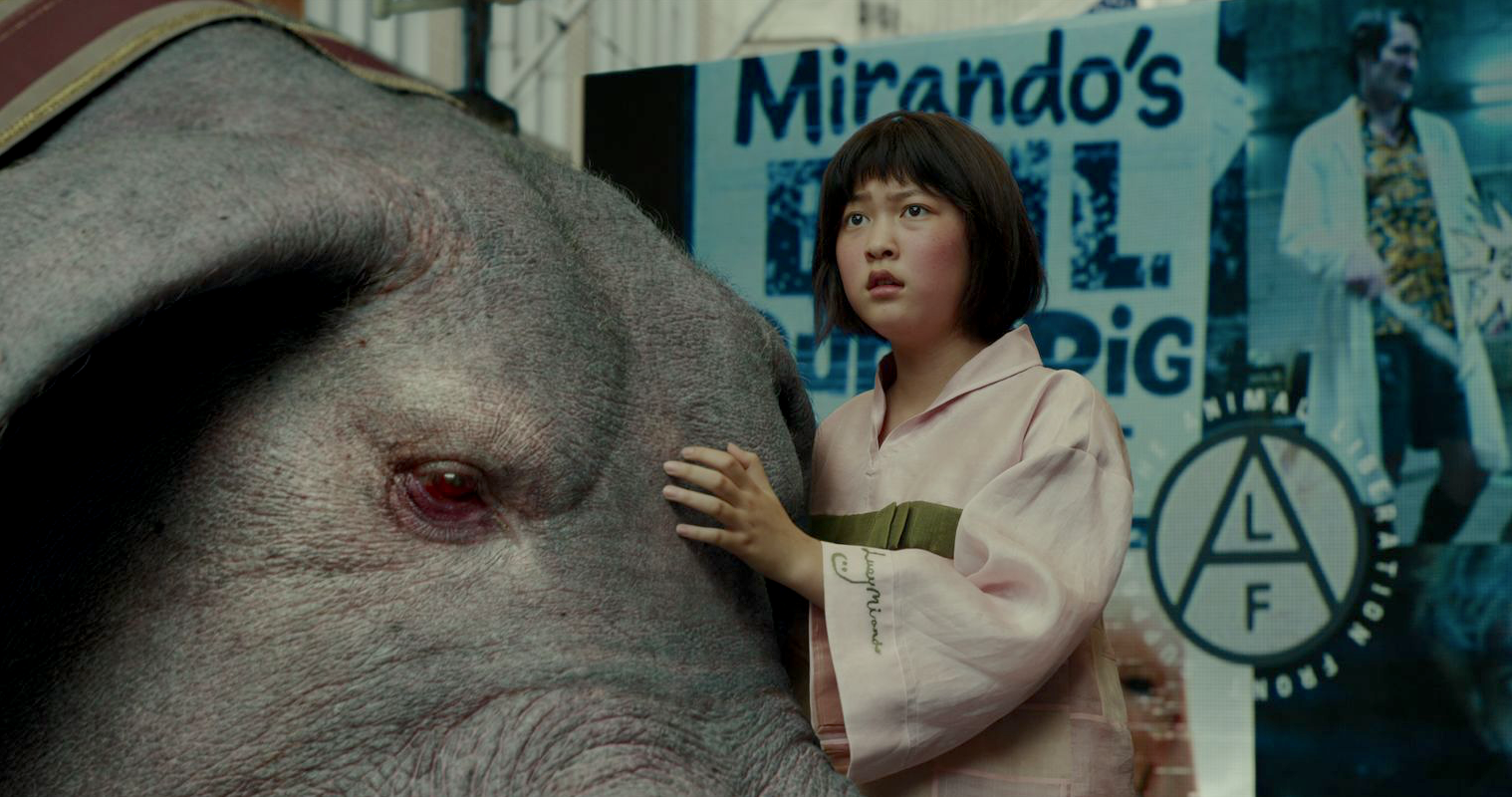If your beloved pet was taken from you and sent across the world to be slaughtered for food, what would you do? Bong Joon-Ho, director of “Okja,” and latest film “Snowpiercer,” asks just that. “Okja” is all at once satire, action, drama, comedy and horror, offering a harrowing critique of the factory-farm industry, which ingeniously serves as a backdrop for a girl’s quest to save her super-pig, Okja.
The movie follows Mija, played by Seo-Hyun Ahn, a young girl who lives on an isolated farm in the Korean mountains with her grandfather and her best friend/super-pig. Okja is said to be one of twenty-six miraculous new super-pigs, born in Arizona and distributed around the world by the Mirando Corporation to be raised by local farmers for ten years, at the end of which the “best super-pig” was to be selected. Okja is a fascinating creature, near elephant-size and gray, with a hippo-like snout but pig-like floppy ears. She is immediately endearing, shown, in her interactions with Mija as the two go about the forested hillside together, to be gentle, intelligent, playful, compassionate and trusting. Their idyllic peace is soon jeopardized when Johnny Wilcox (Jake Gyllenhaal), a washed-up television naturalist and face of the Mirando Corporation’s marketing campaign, arrives with a camera crew and members of the corporation’s Korean division. Mija thought she and her grandfather had purchased Okja, but she was tricked, and the Mirando crew takes Okja away when Mija is distracted.
The film kicks into high-gear as Mija sets off on her own to rescue Okja from the Mirando Corporation, bravely traversing large distances, bashing through barriers and chasing trucks to save her friend, accidentally running into the Animal Liberation Front (ALF), a radical, but non-violent group bent on freeing animals from cruelty and exposing the evils of factory farming. Soon, Mija’s rescue mission, the ALF’s sabotage plans and the Mirando Corporation’s desperate attempt to reform their image in the public eye all become hopelessly entangled, and Okja is caught helpless in the crossfire.
“Okja” is a film strengthened greatly by its cast. Tilda Swinton plays Lucy Mirando, the fumbling, frustrated CEO of the Mirando Corporation, determined to rebrand her father’s vicious company whilst still utilizing brutal methods beneath a new friendly facade. Swinton does a fantastic job creating a villain at once awkward and vulnerable, yet hopelessly detached and delusional. Giancarlo Esposito accompanies Swinton as Frank Dawson, Mirando’s close and cunning advisor. Esposito perfectly embodies the smug, diplomatic and deadly effect of a corporate strongman working in the shadows. Gyllenhaal is beautifully bizarre in his role as Wilcox, acting as a wheezing, squeaking and manic former television star whose soul has been broken.
The Animal Liberation Front is similarly well cast, with Paul Dano and Steven Yeun as Jay and K, the group’s two central characters. Dano’s reserved and theatrical righteousness works well alongside Yeun’s earnest headstrong energy, helping to characterize the rest of the ALF as a well-meaning, but naïve band of kids who are both incredible and very out of their depth.
At the center of it all is Ahn’s spectacular performance as Mija. Even as she performs action stunts and stares down multi-national corporate enemies, Ahn still plays a believable young girl whose priorities are very simple. Considering her co-star was a CGI (computer generated imagery) creature added in post-production, Ahn should be congratulated for her skill in conveying subtle, heart-wrenching and real emotional connection with Okja. Without Ahn’s skill the movie would have surely failed.
“Okja” is triumphant in multiple respects. The action sequences are riveting and the emotional drama intense. The script is simultaneously funny and distressing. The corporate environments feel claustrophobic and fake, filled with strained nervous smiles, while the ALF’s banter makes one feel as if they’re watching a modern incarnation of Robin Hood and his Merry Men. The plot takes the audience on an international journey, blending language in significant ways, and dances from the mountains and subways of Korea to the city streets of New York and the surrounding urban sprawl, endowing each setting with a distinct energy.
The ability of “Okja” to balance all these components comes from the brilliant plot structure. The film could have easily become a painfully overt satire about the evils of corporate greed and consumer gluttony while character and plot took a backseat, but “Okja” does the opposite. The film never loses sight of the central conflict: Mija’s relentless quest to get Okja back, and the love the two have for one another. The larger motivations of the ALF and the Mirando Corporation, and the opposing ideologies they represent, are layered around this grounded struggle, enhancing and raising its stakes rather than diminishing it for the sake of wider social commentary.
The film’s message is brutally effective without ever having to be grandiose. By presenting Okja as a lovable, strange pet creature who lives with a young girl in the countryside, before placing her in serious danger, and then gradually widening the scope to show the viewer what happens, what was always planned to happen to creatures like Okja, the film horrifies the audience and makes them question their own assumptions of what should happen to certain animals. “Okja” is not trying to convert you to veganism, but rather show you where meat comes from without any silver lining.
“Okja” is streaming on Netflix now, and is guaranteed to take your breath away. Above all, the movie is about the strong love between animals and people. In one of the most iconic and quiet scenes, Mija leans in to Okja’s massive head and whispers something unheard into her giant ear. Okja’s orange eyes flicker patiently and thoughtfully. Mija pulls back, and the little girl and her super-pig hug each other tight.

















